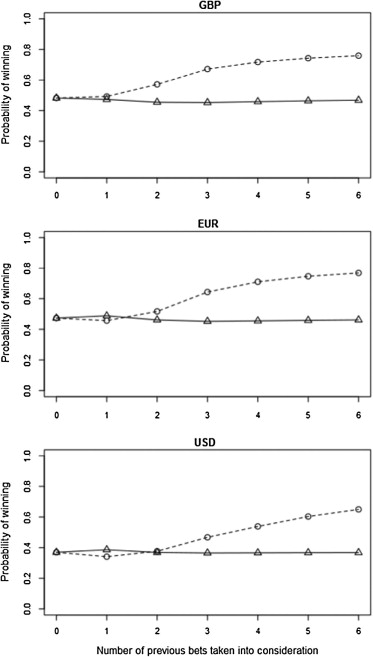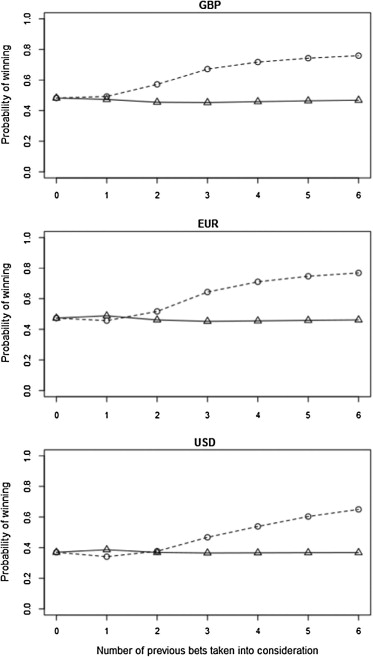Gambling winning streaks are real, and shockingly quantifiable, researchers suggest


Earlier this month, two researchers at University College, London, published some surprising findings in the journal Cognition. The gambling phenomenon known as the "hot hand" — the idea that if you are on a winning streak you'll continue to win — is real. And not only is it real, but your chances of winning appear to rise significantly after each winning hand.
Juemin Xu and Nigel Harvey reached their conclusion by studying 565,915 online sports bets made by 776 gamblers in 2010. Overall, the gamblers won 40 percent of the time (the house always wins, eventually). But if one of the gamblers won, his odds of winning the next hand rose to 49 percent, then 57 percent in hand three, 67 percent in hand four, 72 percent on the fifth wager, and an insane 75 percent on the sixth consecutive winning hand. This is what that looks like in graph form, via Xu and Harvey's paper:

For losers, flip those charts horizontally: Losers keep on losing and losing. Skill had nothing to do with it either way. What's going on? "I certainly don't want people to think that if you're winning that you're more likely to win and eventually you win, win, win," Xu told says The New Yorker's Jay Caspian Kang. The key is apparently the gambler's fallacy, described by Xu and Harvey as "If you have been losing, you are more likely to win in future."
The Week
Escape your echo chamber. Get the facts behind the news, plus analysis from multiple perspectives.

Sign up for The Week's Free Newsletters
From our morning news briefing to a weekly Good News Newsletter, get the best of The Week delivered directly to your inbox.
From our morning news briefing to a weekly Good News Newsletter, get the best of The Week delivered directly to your inbox.
What appears to happen, according to the paper, is that "after winning, gamblers selected safer odds. After losing, they selected riskier odds." Winners keep on winning, Xu and Harvey say, because they are "worried their good luck was not going to continue, so they selected safer odds." Sure, but if you're losing, looks best to walk away.
A free daily email with the biggest news stories of the day – and the best features from TheWeek.com
Peter has worked as a news and culture writer and editor at The Week since the site's launch in 2008. He covers politics, world affairs, religion and cultural currents. His journalism career began as a copy editor at a financial newswire and has included editorial positions at The New York Times Magazine, Facts on File, and Oregon State University.
-
 ‘Implementing strengthened provisions help advance aviation safety’
‘Implementing strengthened provisions help advance aviation safety’Instant Opinion Opinion, comment and editorials of the day
-
 How Manchesterism could change the UK
How Manchesterism could change the UKThe Explainer The idea involves shifting a centralized government to more local powers
-
 Church of England instates first woman leader
Church of England instates first woman leaderSpeed Read Sarah Mullally became the 106th Archbishop of Canterbury
-
 Blue Origin launches Mars probes in NASA debut
Blue Origin launches Mars probes in NASA debutSpeed Read The New Glenn rocket is carrying small twin spacecraft toward Mars as part of NASA’s Escapade mission
-
 Dinosaurs were thriving before asteroid, study finds
Dinosaurs were thriving before asteroid, study findsSpeed Read The dinosaurs would not have gone extinct if not for the asteroid
-
 SpaceX breaks Starship losing streak in 10th test
SpaceX breaks Starship losing streak in 10th testspeed read The Starship rocket's test flight was largely successful, deploying eight dummy satellites during its hour in space
-
 Rabbits with 'horns' sighted across Colorado
Rabbits with 'horns' sighted across Coloradospeed read These creatures are infected with the 'mostly harmless' Shope papilloma virus
-
 Lithium shows promise in Alzheimer's study
Lithium shows promise in Alzheimer's studySpeed Read Potential new treatments could use small amounts of the common metal
-
 Scientists discover cause of massive sea star die-off
Scientists discover cause of massive sea star die-offSpeed Read A bacteria related to cholera has been found responsible for the deaths of more than 5 billion sea stars
-
 'Thriving' ecosystem found 30,000 feet undersea
'Thriving' ecosystem found 30,000 feet underseaSpeed Read Researchers discovered communities of creatures living in frigid, pitch-black waters under high pressure
-
 New York plans first nuclear plant in 36 years
New York plans first nuclear plant in 36 yearsSpeed Read The plant, to be constructed somewhere in upstate New York, will produce enough energy to power a million homes
